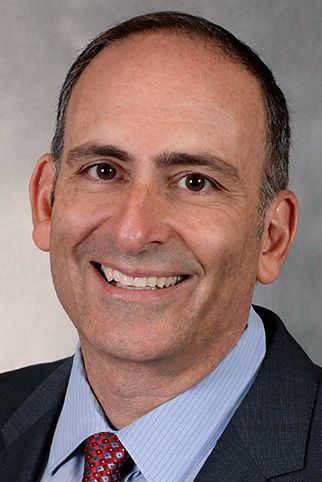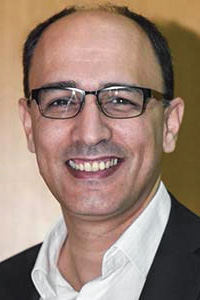

 Karl Bode recently wrote an excellent article highlighting the overhyping of wireless technologies. He's right, and for the last twenty years, we've been told that a world-changing wireless technology is coming soon, but none ever materialized. No wireless technology has been a bigger flop than 5G when comparing the hype to the eventual reality. The hype for 5G was amazingly over-the-top. more
Karl Bode recently wrote an excellent article highlighting the overhyping of wireless technologies. He's right, and for the last twenty years, we've been told that a world-changing wireless technology is coming soon, but none ever materialized. No wireless technology has been a bigger flop than 5G when comparing the hype to the eventual reality. The hype for 5G was amazingly over-the-top. more
 DOTZON presents the fifth edition of the Digital Company Brands study. After having introduced the study in 2018, DOTZON continued to expand and enhance the underlying data to display how companies successfully use their Digital Company Brands. The Digital Company Brand is the digital dimension of a company brand and mirrors the "digitalness "of a company. Purely digital company brands developed for the first time in the 1990s with the emergence of Internet business models. more
DOTZON presents the fifth edition of the Digital Company Brands study. After having introduced the study in 2018, DOTZON continued to expand and enhance the underlying data to display how companies successfully use their Digital Company Brands. The Digital Company Brand is the digital dimension of a company brand and mirrors the "digitalness "of a company. Purely digital company brands developed for the first time in the 1990s with the emergence of Internet business models. more
 I'm asked at least twenty times a year how a small ISP can compete against the big cable companies. The question comes from several sources - a newly-formed ISP that is nervous about competing against a giant company, a rural ISP that is entering a larger market to compete, or investors thinking of funding a new ISP. These folks are rightfully nervous about competing against the big cable companies. more
I'm asked at least twenty times a year how a small ISP can compete against the big cable companies. The question comes from several sources - a newly-formed ISP that is nervous about competing against a giant company, a rural ISP that is entering a larger market to compete, or investors thinking of funding a new ISP. These folks are rightfully nervous about competing against the big cable companies. more
 Blockchain domain names, domains that are stored on blockchain or cryptocurrency exchanges, are part of a growing, unregulated, and decentralized internet. Right now, blockchain domains are used mostly by cryptocurrency users, but they are growing in popularity - the Ethereum name service reported over 2.2 million .eth domain name registrations in 2022. At the same time, crypto scams are also exploding, reaching a total of $3.5 billion in losses in 2022. more
Blockchain domain names, domains that are stored on blockchain or cryptocurrency exchanges, are part of a growing, unregulated, and decentralized internet. Right now, blockchain domains are used mostly by cryptocurrency users, but they are growing in popularity - the Ethereum name service reported over 2.2 million .eth domain name registrations in 2022. At the same time, crypto scams are also exploding, reaching a total of $3.5 billion in losses in 2022. more
 New technology enables new art forms and artists Kit Galloway and Sherrie Rabinowitz (K&S) began working with geostationary satellite links in 1977. Their first work was an experiment in remote dance and music. Video of dancers at The Goddard Space Flight Center in Maryland and an educational television center in California was transmitted to a central control studio where a composite was formed and sent back to monitors the dancers could see. more
New technology enables new art forms and artists Kit Galloway and Sherrie Rabinowitz (K&S) began working with geostationary satellite links in 1977. Their first work was an experiment in remote dance and music. Video of dancers at The Goddard Space Flight Center in Maryland and an educational television center in California was transmitted to a central control studio where a composite was formed and sent back to monitors the dancers could see. more
 Wolfgang Kleinwaechters Internet Governance Outlook on CircleID each year sums up the drama of internet governance as it is played out on the global stage. We assume that all players on the internet governance stage work under the premise that despite all our differences, ultimately, we are united in our quest for "freedom from fear and want" based on the quality and dignity of all human beings, as expressed in the Universal Declaration of Human Rights (UDHR). more
Wolfgang Kleinwaechters Internet Governance Outlook on CircleID each year sums up the drama of internet governance as it is played out on the global stage. We assume that all players on the internet governance stage work under the premise that despite all our differences, ultimately, we are united in our quest for "freedom from fear and want" based on the quality and dignity of all human beings, as expressed in the Universal Declaration of Human Rights (UDHR). more
 The EU is reforming its legal framework concerning geographical indications (GI) protection and has put forward provisions expanding GI protection to domain names in two recent legislative proposals concerning agricultural products and craft/industrial products. In order to support greater GI protection on the internet, both proposals mandate the European Union Intellectual Property Office (EUIPO) to establish a "domain name information and alert system." more
The EU is reforming its legal framework concerning geographical indications (GI) protection and has put forward provisions expanding GI protection to domain names in two recent legislative proposals concerning agricultural products and craft/industrial products. In order to support greater GI protection on the internet, both proposals mandate the European Union Intellectual Property Office (EUIPO) to establish a "domain name information and alert system." more
 In the first article of this two-part blog series, we looked at how frequently domains were used by bad actors for phishing activity across individual top-level domains (TLDs) or domain extensions, using data from CSC's Fraud Protection services, powered by our DomainSecSM platform. In this second article, we analyze multiple datasets to determine the highest-threat TLDs, based on the frequency with which the domains are used egregiously for a range of cybercrimes. more
In the first article of this two-part blog series, we looked at how frequently domains were used by bad actors for phishing activity across individual top-level domains (TLDs) or domain extensions, using data from CSC's Fraud Protection services, powered by our DomainSecSM platform. In this second article, we analyze multiple datasets to determine the highest-threat TLDs, based on the frequency with which the domains are used egregiously for a range of cybercrimes. more
 One of the consequences of the war between Russia and Ukraine is that Russia has largely stopped participating in many large worldwide web applications. Russia has blocked Facebook and Twitter. Other applications like Apple, Microsoft, TikTok, Netflix, and others have withdrawn from Russia. The European Union is in the process of trying to block Russian-generated content, such as the state-owned news outlets of RT (formerly Russia Today) and Sputnik. more
One of the consequences of the war between Russia and Ukraine is that Russia has largely stopped participating in many large worldwide web applications. Russia has blocked Facebook and Twitter. Other applications like Apple, Microsoft, TikTok, Netflix, and others have withdrawn from Russia. The European Union is in the process of trying to block Russian-generated content, such as the state-owned news outlets of RT (formerly Russia Today) and Sputnik. more
 A domain name consists of two main elements: the second-level domain name to the left of the dot - often consisting of a brand name or relevant keywords - and the domain extension or top-level domain (TLD) to the right of the dot. Domain names form the key elements of the readable web addresses allowing users to access pages on the internet and also allowing the construction of email addresses. more
A domain name consists of two main elements: the second-level domain name to the left of the dot - often consisting of a brand name or relevant keywords - and the domain extension or top-level domain (TLD) to the right of the dot. Domain names form the key elements of the readable web addresses allowing users to access pages on the internet and also allowing the construction of email addresses. more
 In 2022, the Internet world was shaken by big contradictions. On the one hand, efforts to constitute a stable and secure framework for a safe cyberspace made substantial progress. The UN got a new Tech Envoy. The UN-based Internet Governance Forum (IGF) got a "Leadership Panel." The UN negotiations on cybersecurity and cybercrime produced constructive interim results. more
In 2022, the Internet world was shaken by big contradictions. On the one hand, efforts to constitute a stable and secure framework for a safe cyberspace made substantial progress. The UN got a new Tech Envoy. The UN-based Internet Governance Forum (IGF) got a "Leadership Panel." The UN negotiations on cybersecurity and cybercrime produced constructive interim results. more
 The recent adoption at the end of December of the new EU Directive for a high level of cybersecurity across the Union -- commonly referred to as "NIS2" - paved the way for important updates to the domain name system (DNS). Most significantly, Article 28 of NIS2 and its related recitals resolved any ambiguities about the public interest served by a robust and objectively accurate WHOIS system that permits legitimate access by third parties to data... more
The recent adoption at the end of December of the new EU Directive for a high level of cybersecurity across the Union -- commonly referred to as "NIS2" - paved the way for important updates to the domain name system (DNS). Most significantly, Article 28 of NIS2 and its related recitals resolved any ambiguities about the public interest served by a robust and objectively accurate WHOIS system that permits legitimate access by third parties to data... more
 Having been involved in this sector for over fifteen years now, the rate of change in the market dynamics continues to surprise me - from its early years when MarkMonitor and NetNames clearly led the space for several years, then seeing well-funded startups such as Yellow Brand Protection and Incopro challenge that, followed by a period of heavy M&A, it is now extremely diverse. more
Having been involved in this sector for over fifteen years now, the rate of change in the market dynamics continues to surprise me - from its early years when MarkMonitor and NetNames clearly led the space for several years, then seeing well-funded startups such as Yellow Brand Protection and Incopro challenge that, followed by a period of heavy M&A, it is now extremely diverse. more
 At the beginning of 2023, the good news is that, in spite of all geopolitical tensions, the Internet infrastructure built around TCP/IP continues to carry emails, web pages, videos, and podcasts across the globe. Technically, the Internet remains robust. The bad news is that more and more digital borders will continue to affect the global nature of international digital communication... more
At the beginning of 2023, the good news is that, in spite of all geopolitical tensions, the Internet infrastructure built around TCP/IP continues to carry emails, web pages, videos, and podcasts across the globe. Technically, the Internet remains robust. The bad news is that more and more digital borders will continue to affect the global nature of international digital communication... more
 Internet Governance is a complex and constantly evolving field that touches upon many aspects of the global digital landscape. It encompasses everything from technical standards and protocols, to policy and regulatory issues, to the social, economic, and cultural impacts of the internet. With such a wide range of stakeholders and interests at play, it's no wonder that the community of Internet Governance professionals is so diverse. more
Internet Governance is a complex and constantly evolving field that touches upon many aspects of the global digital landscape. It encompasses everything from technical standards and protocols, to policy and regulatory issues, to the social, economic, and cultural impacts of the internet. With such a wide range of stakeholders and interests at play, it's no wonder that the community of Internet Governance professionals is so diverse. more
Sponsored byVerisign

Sponsored byCSC

Sponsored byRadix

Sponsored byIPv4.Global

Sponsored byVerisign

Sponsored byDNIB.com

Sponsored byWhoisXML API
